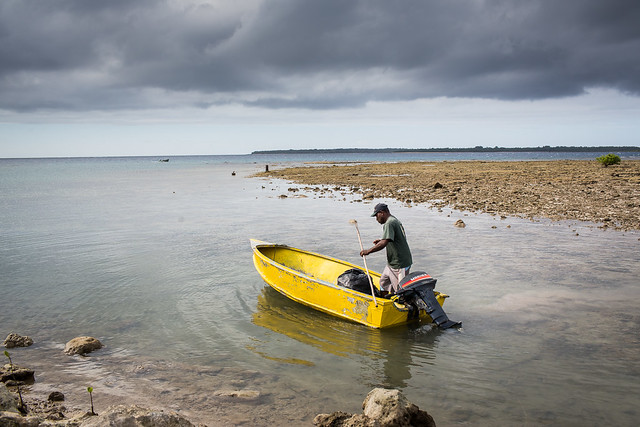A ‘vuvale’ partnership for the Pacific islands?
Posted By Richard Herr on June 19, 2019 @ 11:00

During ASPI’s recent panel discussion on the Pacific, Graeme Dobell [1] referred to the Fiji–Australia Vuvale Partnership [2] as an important pointer to Australia’s future ‘step-up’ relations with the Pacific islands region.
He had written earlier this year [3] of the positive and intimate ‘family’ (vuvale) relationship conveyed by the January 2019 agreement between Prime Minister Josaia Voreqe ‘Frank’ Bainimarama and Prime Minister Scott Morrison.
While the inclusiveness of the family concept might play well at a rhetorical level, there are risks in taking the bilateral rapprochement to the regional level, both in philosophy and in historical experience.
Philosophically, the content of ‘family values’ is very much in the eye of the beholder.
Frequently eulogised by parties of the right for the presumed stability and conservative bias of these values, families are rarely democratic structures.
Family values are inherited rather than constructed. They are passed on from generation to generation by socialising new members into the standards expected of them in ways that are rarely consensual or negotiated.
Thus, as Stephanie Copus-Campbell indicated in the panel discussion, it can carry a possible taint of paternalism (who is/are the parent/s in the family?)—particularly if it is perceived as being unilaterally declared by Australia.
Beyond the initial rhetorical benefits of a new more intimate inclusiveness, the idea of a family with shared values will be a slippery and downward slope if unwisely used in negotiations on anything of regional substance.
Whose norms are to prevail as the Pacific family’s values? Will it be the more hierarchically structured values of the Polynesian extended family, the more egalitarian but more fractured social values of Melanesia, or the liberal democratic ideals of Australia?
As noted during the panel discussion, the shared family values even between states as close as Australia and New Zealand don’t always produce harmony.
Remember how the Kiwis felt over the underarm bowling incident [4] or, more seriously, the sense of betrayal Wellington felt when Canberra chose ANZUS over the ANZAC family tie in the USS Buchanan affair [5]?
In the early days of Pacific Islands Forum, there was fairly regular and friendly banter among the mainly Polynesian leaders about who was the younger brother or the uncle within their ‘family’ of shared ethnicity and values.
Fijian statesman Ratu Sir Kamisese Mara built on this relational sense of common identity to assert the family values that he encapsulated in the phrase ‘the Pacific Way’. However, as the centre of the forum shifted away from Polynesia, the phrase fell out of use.
Melanesians had a different sense of how to resolve family differences. Indeed, they went so far as to formalise their deeper sense of family values in the Melanesian Spearhead Group [6].
The cultural differences among the three broad ethno-geographic groups in the region, much less their individual national interests, can never be dismissed too lightly whenever significant matters are addressed regionally.
Building a role in the Pacific islands as part of a ‘community’ that shares aspirations, responsibilities and common purpose has been a more solid footing of relationships than confected ‘family ties’.
Ratu Mara and Albert Henry, the first premier of the Cook Islands, did Australia and New Zealand a great honour by inviting us into the Pacific Islands Forum from the outset and including us in this community as of right. No other extra-regional country has been so honoured since. (Significantly if this is viewed as a family affair, then it was they who adopted us not we them!)
A few years ago, Bainimarama tried to undo this ‘mistake’. The creation of the Pacific Islands Development Forum (PIDF) was intended to be a banishment for not properly sharing the values of the regional community.
Fortunately for Australia, the PIDF has not quite enjoyed the regional support Bainimarama hoped for, but it still stands as a message not entirely dispelled by the vuvale reunion.
Indeed, for example, the fact that we have not joined our region in the UN groupings is still cited as a sign that our vanua (land/people) is still European and not part of the family of Pacific islanders.
Honorary ‘family’ status is an important indicator of special intimacy that should not be minimised. The implied warmth and inclusiveness should be valued. But care should be taken against accepting it and the obligations of family literally.
In practical terms, close friends frequently share more of our hopes and our secrets than do members of our own families. The obligations of friendship (or perhaps mateship) are real and often better understood.
To take one example from the panel discussion, will Australia embrace a huge wave of economic refugees from Melanesia (especially Papua New Guinea) should the demographic bulge of young people there burst the capacity of these states to deliver on their aspirations?
Will they be treated as ‘family’ entitled to come ‘home’? (This was not the message at federation in the 1890s.)
Over time, immigration and mutual interdependent development may well lead Australia to the sort of blended family ties that New Zealand enjoys with the Pacific islands. In the interim, a close and genuine sense of community is a more practical aspiration.
Article printed from The Strategist: https://www.aspistrategist.org.au
URL to article: https://www.aspistrategist.org.au/a-vuvale-partnership-for-the-pacific-islands/
URLs in this post:
[1] Graeme Dobell: https://www.aspistrategist.org.au/author/graeme-dobell/
[2] Fiji–Australia Vuvale Partnership: https://www.pm.gov.au/media/joint-statement-prime-minister-fiji
[3] earlier this year: https://www.aspistrategist.org.au/imagining-australias-south-pacific-family/
[4] underarm bowling incident: https://www.stuff.co.nz/sport/cricket/109994406/bruce-edgar-opens-up-on-the-underarm-incident-that-infuriated-new-zealand
[5] USS Buchanan affair: https://nzhistory.govt.nz/page/uss-buchanan-refused-entry-new-zealand
[6] Melanesian Spearhead Group: https://www.msgsec.info/
Click here to print.